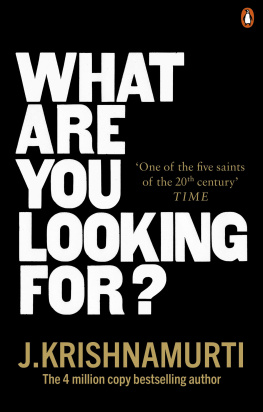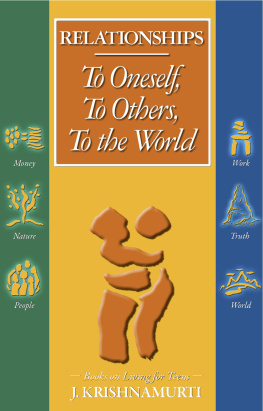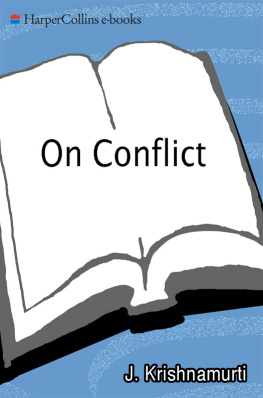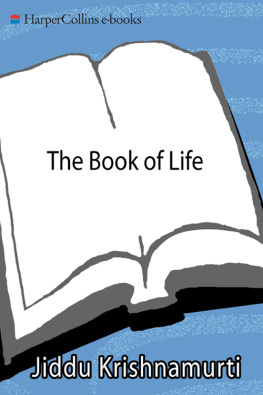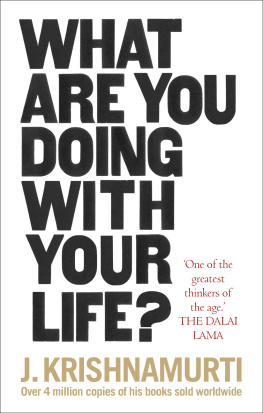Krishnamurti - Facing a World in Crisis: What Life Teaches Us in Challenging Times
Here you can read online Krishnamurti - Facing a World in Crisis: What Life Teaches Us in Challenging Times full text of the book (entire story) in english for free. Download pdf and epub, get meaning, cover and reviews about this ebook. publisher: Shambhala, genre: Religion. Description of the work, (preface) as well as reviews are available. Best literature library LitArk.com created for fans of good reading and offers a wide selection of genres:
Romance novel
Science fiction
Adventure
Detective
Science
History
Home and family
Prose
Art
Politics
Computer
Non-fiction
Religion
Business
Children
Humor
Choose a favorite category and find really read worthwhile books. Enjoy immersion in the world of imagination, feel the emotions of the characters or learn something new for yourself, make an fascinating discovery.

- Book:Facing a World in Crisis: What Life Teaches Us in Challenging Times
- Author:
- Publisher:Shambhala
- Genre:
- Rating:5 / 5
- Favourites:Add to favourites
- Your mark:
- 100
- 1
- 2
- 3
- 4
- 5
Facing a World in Crisis: What Life Teaches Us in Challenging Times: summary, description and annotation
We offer to read an annotation, description, summary or preface (depends on what the author of the book "Facing a World in Crisis: What Life Teaches Us in Challenging Times" wrote himself). If you haven't found the necessary information about the book — write in the comments, we will try to find it.
Facing a World in Crisis: What Life Teaches Us in Challenging Times — read online for free the complete book (whole text) full work
Below is the text of the book, divided by pages. System saving the place of the last page read, allows you to conveniently read the book "Facing a World in Crisis: What Life Teaches Us in Challenging Times" online for free, without having to search again every time where you left off. Put a bookmark, and you can go to the page where you finished reading at any time.
Font size:
Interval:
Bookmark:
Facing a World in Crisis: What Life Teaches Us in Challenging Times
Copyright 2005 by Krishnamurti Foundation Trust, Ltd
F ACING
A W ORLD
I N C RISIS
What Life Teaches Us in Challenging Times
J. KRISHNAMURTI
EDITED BY DAVID SKITT
C ONTENTS
I NTRODUCTION
Nowadays we know more about what is happening in the world than ever before. Global TV coverage means that every natural disaster, every war, every terrorist attack, every major sporting event is brought, often live, before our eyes.
Although such reporting is often biased toward sensational events involving strife and death, it also forces us to face inescapably hard facts about the world we live in. Wars due to the savage mix of territorial disputes with religion and nationalism; the clash of cultures, each sure its values are universal; the new height of violence shown by suicide attacks are a daunting overture to a new millennium. They seem even more daunting when growing economic interdependence, environmental damage, conflict over water supplies, and climate change demand a new sense of shared interest, a new and vital human togetherness, if some kind of cataclysm is to be averted. The old loyalties to ones own country, religion, or political ideology seem dangerously at odds with a reality that demands loyalty to the human species as a whole, rather than to ones preferred segment of it.
Throughout the 1970s J. Krishnamurti, who had been talking to audiences around the world for more than fifty years, began to speak repeatedly about looking at the state of the world as a first step in looking at the way each of us lives his or her life. To turn away from world events, to think that what is going on out there has nothing to do with me, was for him not to be alive to what life has to teach, a fake retreat from the vast arena of human behavior where all of us are actors, whether we like it or not. To recoil from the worlds violence and set ourselves apartsomething we do not do, of course, with lifes pleasureswas a serious misperception, a failure to see and to feel in our blood that we are all in the same boat. This error, he maintained, would inevitably lead to ineffectual action and conflict.
This view, often expressed by Krishnamurti in the phrase I am the world, has been stated by others. The philosopher Thomas Hobbes wrote, Whosoever looks into himself shall know the thoughts and passions of all other men, and Montaigne said, Every man carries in him the whole of the human condition. Not content with merely stating the maxim, Krishnamurti goes on to explore its implications in great depth and detail and to ask, since each of us is a participant, what our response is to the present insecure, disturbing state of the world.
But then he raises a more fundamental issue: What kind of a mind is capable of responding adequately to it? What are the obstacles to having such a mind? This is not unlike a scientist who before studying a phenomenon looks to the quality of the apparatus that will be used to observe it. In Part One of this book, Krishnamurti explores these obstacles. He suggests that insight into their nature not only brings about the right response to events in the world politically, economically, and religiously, but also reveals their psychological origins in our personal lives and relationships. Psychologically, the dividing line between the person and society disappears. Poetically, he often describes this as the tide going out and the tide coming in.
What he says may disappoint readers who want pat answers from an authority whom they can then believe in. For Krishnamurti, to want this not only atrophies the brain but contributes dangerously to political and religious tyranny in the world. And in our personal relationships it may easily lead to one person dominating the other. What he gives us are not theories or explanations but statements to test against our experience or questions to kick-start our own inquiry. Life is something we need to explore for ourselves; it is greater, he says, than any teacher or teaching. To see it in any other way is to be a secondhand human being.
Many people have called Krishnamurti a mystic, a word that can be used to grant him exalted status and/or to dismiss him as irrelevant. But what he says is time and again very relevant to personal relationships and to politics. In almost every talk he refers to the destructiveness of image making in the relationship between man and woman, and with regard to authoritarian political systems, it is of interest to note that historians have described their prerequisites as follows: First, there is the inculcation of a sense of us and them; second, willingness to conform; third, not opposing harm being done to them and passing responsibility for this on to the authorities, while assuming that they are not human in the way we are; fourth, not opposing the suppression of dissent; and fifth, not opposing, or going along with, extermination of them. This is not just a psychological scenario for succumbing to political tyranny or for the persecution of an ethnic minority. It is also a psychological scenario that motivates a whole nation to go to war with another.
What does Krishnamurti say that challenges this sorry process? He points repeatedly to the unreality of the them and us distinction between human beings, the falseness of such images, and the neurotic allegiances they give rise to. While accepting that conformity to some rules is socially necessary, he sees conformity to and belief in political and religious authorityincluding, as already pointed out, any attributed to him personallyas a form of social and psychological oppression stunting the brain. In doing so he is thus proposing potential barriers in us to the kind of political systems that wrought havoc in the twentieth century and whose seeds continue to be sown in the present one.
So though a mystic is usually defined as someone concerned with ultimate reality and truths beyond the intellect, and Krishnamurti was also very much concerned with these, the relevance of what he says to authoritarianism shows that at the same time he had his feet firmly on the ground. Indeed, one could say much more firmly on the ground than many of us who, considering ourselves wholly rational and not mystical at all, have succumbed to blind faith in leaders or beliefs that have led to human suffering on an unprecedented scale.
Those reading Krishnamurti for the first time may find his free-ranging discourses disconcerting. Though they are carefully sequenced, he always responds to questions from his audience, even in mid-flow and however irrelevant they may seem to the main theme of his talk. But often, as already mentioned, it is he, the speaker, who puts questions to the audience rather than, as is usually the case, the other way around. As will be seen, at times he firmly declines to answer his own questions. On other occasions, he maintains that the answer to the question is in the question itself and proceeds to explore its terms. And he constantly warns against agreeing or disagreeing intellectually with what he says rather then checking it against our own experience. So there is a need often to delve behind his words. As he often said, The word is not the thing.
The impression one often gets is that he wants to jolt our brains out of a complacent sluggishness that we have wrongly taken for granted, as though we are unwitting prisoners of limitations that we fail to see are self-imposed. Again, for him this is the kind of issue that can only be explored by each one of us, and no one else has the right to answer on our behalf.
At a talk in India in 1965, after Krishnamurti had spoken of the need for radical, deep change in the human being, a member of the audience protested, We are all ordinary human beings. His response was, We cannot afford to be ordinary human beings anymore ... the challenge is too immense. At another talk a member of the audience argued that none of the great religious teachers had fundamentally changed the world, and neither would Krishnamurti. His answer: Our problem is, can we immediately and altogether stop thinking in terms of becoming? That is the only new approach. Perhaps it is worth explaining for new readers that preoccupation with becoming something or somebody was for Krishnamurti the major hurdle to understanding ones present state of being, which he called
Next pageFont size:
Interval:
Bookmark:
Similar books «Facing a World in Crisis: What Life Teaches Us in Challenging Times»
Look at similar books to Facing a World in Crisis: What Life Teaches Us in Challenging Times. We have selected literature similar in name and meaning in the hope of providing readers with more options to find new, interesting, not yet read works.
Discussion, reviews of the book Facing a World in Crisis: What Life Teaches Us in Challenging Times and just readers' own opinions. Leave your comments, write what you think about the work, its meaning or the main characters. Specify what exactly you liked and what you didn't like, and why you think so.







